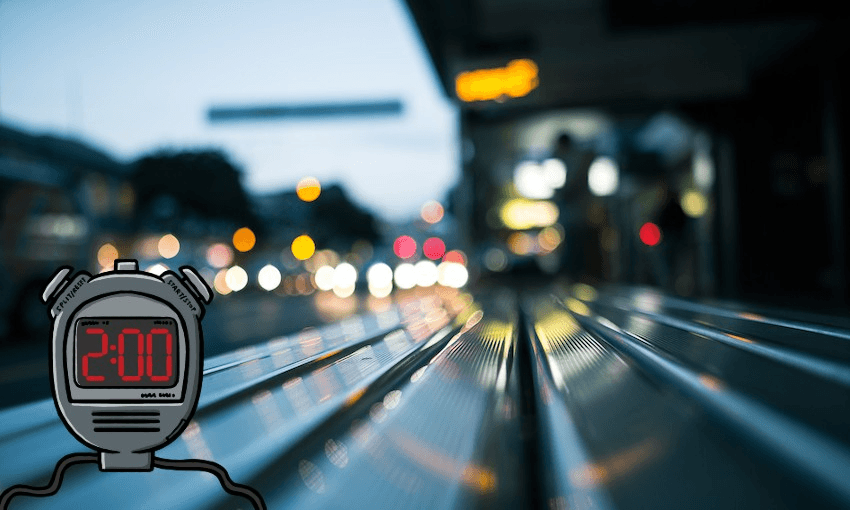Voting is under way in the New Zealand general election. Explore the main parties’ pledges at Policy.nz, but here’s a whistle-stop tour of what’s on offer in the world of transport.
Read more two-minute policy wraps here
Public transport
While there are a range of policy ideas for different areas of transport, only two parties have universal public transport policies.
The Māori Party has announced it would make public transport free for all tertiary students.
The Greens would go a step further, outline a comprehensive plan to allow for all under 18s and over 65s to access free public transport. Students would travel at half price. This would be achieved with a nationwide “Go Anywhere” transport pass.
Rail
Rail is one of the big transport focuses for most political parties.
With Labour’s 2017 promise of light rail up Dominion Road and a connection to the airport appearing dead in the water, the party has dropped the policy altogether from its 2020 manifesto.
Labour’s transport policy is rather thin at the moment, with the party planning to continue upgrades to the Wellington rail network and continue to fund improvements to transport in general, through the NZ Upgrade Programme.
Meanwhile, National has announced a suite of policy announcements pertaining to heavy rail. Its biggest pledges are to start work on a road and rail tunnel under the Auckland Harbour (especially timely at the moment, with the bridge problems), build a fourth main rail line in Auckland, and build a rail link to Auckland Airport from Puhinui.
Out of Auckland, there’s also a plan to fund new trains for Wellington and electrify and double-track the existing line from Waikanae to Ōtaki.
Among the smaller parties, the Greens have the biggest aspirations. They want to increase funding for trains, with a broad focus outside of just our major cities. That includes more intercity rail along with regional rail to help boost local tourism following Covid-19. Rapid rail in major cities would also get funding.
Finally, New Zealand First is promising to increase funding for the Hillside Workshop rail facility in the South Island and the New Conservatives don’t want any new rail in Auckland. Instead, they want to fund “taxi-style” elevated transport in the supercity.
Cycling and walking
The Greens are the only party to have released specific policies related to cycling and walking infrastructure. They want to create more cycle lanes, along with providing safe walking and cycling routes for every school.
The party would achieve this by supporting local authorities to implement active transport plans created by school communities.
Roads and cars
It might be a transport option of the past, but road transportation continues to be a policy point of the future.
We’ll start with roading, which has seen National release a very detailed series of policies as part of its multibillion-dollar infrastructure policy.
It includes the aforementioned tunnel under the Auckland Harbour Bridge, a four-lane expressway network connecting Whangārei, Auckland, Hamilton and Tauranga, the controversial east-west link and funding $300 million of road improvements.
Out of Auckland, National plans to build a second Terrace Tunnel in Wellington, upgrade sections of State Highway 2 in the Hutt Valley and extend the Kāpiti expressway.
Labour’s pledge builds on its existing track record, promising to continue the Tauranga northern link, and upgrade roads in Canterbury.
On vehicles specifically, the focus from most parties is around electric cars. Labour would require new vehicles to meet fuel efficiency standards and increase funding to support businesses to use low-emissions vehicles. It’s also promised to continue encouraging people to buy electric vehicles through the “low-emission vehicle contestable fund”. This provides up to $6.5 million a year to projects that will increase the uptake of electric vehicles.
National would go a step further, announcing a goal for 80,000 electric vehicles on the road by 2023. It would also exempt electric vehicles from fringe benefit tax and road user charges, and allow them to use bus and high occupancy lanes.
Emissions are also a focus for the Greens, who would offer discounts for low-emissions vehicles countered by one-off fees for the highest-emitting vehicles, when they are imported and registered for the first time.
If elected, The Opportunities Party would tighten emissions standards for newly imported vehicles. It aligns with National in that it would abolish the fringe benefit tax on electric vehicles.
Buses
Buses seem to be left behind this year, in favour of policy around rail. But there are a few policies floating around.
The Greens would increase funding for more buses, and make sure that – along with trains – they are all accessible. Rapid bus services would also be expanded in major cities.
Similarly, the National Party supports rapid bus transport in Wellington, instead of light rail, and in Auckland it would build bus rapid transit from Onehunga through to the city centre.
Funding
The fuel tax is in the firing line for a couple of the smaller parties, with Act planning to replace it with a road pricing system and the New Conservatives hoping to abolish the regional fuel tax and reverse recent fuel tax increases. They would also consider replacing road user charges with a petrol levy.
National would repeal only the Auckland fuel tax, and pause any other fuel tax increases for three years. It would use tolls to fund new roads, specifically its planned Waitematā, Brynderwyn and Kaimai Tunnels (which are more than a decade away).
In contrast, New Zealand First would remove tolls from roads in Tauranga and the Bay of Plenty.
Finally, The Opportunities Party would allow councils to introduce congestion charging, requiring drivers to pay different fees to use a road depending on the level of traffic.
Explore the parties’ pledges in more depth at Policy. The essential campaign dates are here. For all you need to know about the cannabis referendum click here. For the assisted dying referendum click here.





